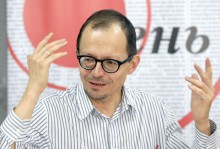Independent American company Pew Research Center released a study on June 10, providing data on public opinion in the eight NATO member countries: Germany, France, Poland, the UK, Italy, Spain, the US, and Canada. As demonstrated by this study, most respondents believe that Russia is to blame for fanning the flames of the conflict in Ukraine. In addition, according to this survey, residents of most of these nations support the provision of economic aid to Ukraine. However, many of them oppose providing lethal weapons to the government of Ukraine. Only the Poles support this idea, with 50 percent in favor.
The survey’s authors note that the NATO countries’ populations are hesitant to participate in a military conflict. At the same time, many respondents reluctantly voted against upholding Article 5 of the North Atlantic Treaty, which requires NATO to provide military assistance to allies that need it.
Overall, 48 percent of respondents believe that their government should use force if Russia got involved in a serious conflict with a member of the alliance. At the same time, such actions are opposed by 42 percent of the survey’s participants. This idea is least supported in Germany, France, and Italy, with 58, 53, and 51 percent, respectively, opposing it. Only the Americans and Canadians (56 and 53 percent, respectively) mostly believe that their nations should resort to military action in the event of a Russian attack on a NATO member.
The Day asked German journalist Gerhard Gnauck to comment on one conclusion of the study, according to which Europeans do not want to fight for their allies.
“West Germany saw a very broad movement against NATO missile deployment in the country in the 1980s. Similar sentiments have survived until now, but they are much weaker at the moment. This issue involves dealing with interwoven lessons of German history which include rejection of military thinking after World War Two as well as a sense of guilt over Germany’s actions in that war. Therefore, the German society tends to think that well-being is more important than freedom, and mi-litary means of protection are ineffective and unnecessary.

“Public opinion is also affected by the Russian propaganda and corruption. With regard to the direct propaganda, Russia Today TV channel’s German-language edition is far less popular than its English edition, broadcast in other countries. Another factor is the fear of Russian nuclear blackmail. It does work.
“However, we must not forget that public opinion has no direct influence on military or political decisions. These are taken by other institutions, I mean the government. Sometimes it takes decisions without taking into account momentary swings of public attitudes.
“Now to how the West can change these attitudes. NATO structures are working on this issue, given the fact that we see a hybrid war going on, which includes the information component. Recently, NATO commissioned a non-public report setting out what should be done on different fronts. People discuss increasing Western broadcasting in Russian.
“It is important that Western leaders do not succumb to Russia’s provocations. So far, Western countries have not allowed themselves to be provoked, even in very risky circumstances. Everyone understands that Russian military aircraft which now fly near the borders of NATO nations while refusing to communicate with traffic controllers do so to provoke the alliance. This is exactly what Russia needs now.
“Many experts in the West believe that should Russian and separatist troops attack Mariupol, the West will automatically begin to supply weapons to Ukraine. However, if it does not happen, the West will continue training the Ukrainian military, supplying specialized communications equipment, and providing economic assistance to Ukraine.”







